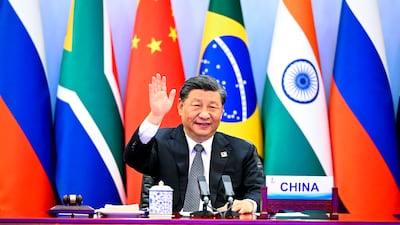Chinese Foreign Ministry spokesman Wang Wenbin has said the economic co-operative bloc of Brazil, Russia, India, China and South Africa, known as Brics, is open to new members.
His comments follow reports that Tunisia is seeking to join the economic bloc, an organisation set up in June 2009 as Bric, with South Africa joining the following year.
Mr Wang said: “The 14th Brics summit's Beijing Declaration made clear the organisation supports membership expansion; China upholds the Brics spirit of openness, win-win co-operation to accelerate the process."
Spokesman for Tunisian President Kais Saied's July 25 movement, Mahmoud Ben Mabrouk, said “the EU pushed Tunisia to seek out financial support and funding from Brics” by being “too slow” to offer financial assistance, local radio Mosaique reported.
Mr Ben Mabrouk also blamed EU members for Tunisia’s delayed negotiations with the IMF for its bailout support package.
“Tunisia opened up several opportunities to the EU to give the country economic support,” he said. "But the Europeans were slow, which pushed Tunisia to move toward the Brics group for funding and investments."
Mr Ben Mabrouk did not provide further details on either the talks or the support Tunisia is seeking.
Although first coined as a term in 2001, when British economist Jim O'Neil predicted that the current member countries would one day be the world's largest economies, Brics became an official organisation eight years later.
The coalition, which brought together powerful developing economies, also held the premise of acting as a counterweight to the G7 group with the view of shifting the global order from the West.
Despite Mr Ben Mabrouk's remarks, no official statements have been made by the Tunisian government on joining the coalition of emerging economies.
Several other countries have previously expressed their interest in joining the group, including Egypt, Saudi Arabia, Iran, Turkey, Indonesia, Argentina and Algeria, which officially submitted its application to join in November.
“Algeria remains interested in the Brics countries because they are an economic and political force to be reckoned with,” its President Abdelmajid Tebboune told Al Jazeera Arabic podcast, reaffirming his country’s intentions to join the bloc and hinting that membership could be on the horizon.
IMF travails
Tunisia had sought $4 billion in funding from the IMF and reached a staff-level agreement with the fund in October for a new 48-month Extended Fund Facility worth about $1.9 billion to support the government’s economic reform programme.
However, it has yet to secure funding from the international lender pending a reform package, which would include subsidies and public spending cuts.
Despite the initial approval of Tunisia’s government on the IMF conditions, Mr Saied described those terms as "a threat to social stability" in the country.
The reforms proposed by the IMF are expected to affect Tunisia’s subsidies system, which regulates prices of essential goods, already in short supply, as well as vital services and the price of petrol, which has increased fivefold in the past year.
Meanwhile, China has been able to forge a role as an alternative resort for countries seeking to pay their debts.
Between 2008 and 2021, China reportedly spent $240 billion bailing out 22 countries, including Argentina, Pakistan, Turkey and Kenya.
Also through the Belt and Road Initiative project — later renamed the Global Development Initiative — the Chinese government allocated nearly $1 trillion dollars in investment and loans in support of infrastructure mega projects in various continents.
Chinese involvement in Tunisia has so far fallen short of its investments in other emerging economies, according to a recent study by the US Washington Institute for Near East Studies, which said Beijing's investment was far smaller than that of France.
The French invest about $2 billion a year in the North African country, but China could soon catch up with continuing projects such as the Melegue dam near El Kef, which is scheduled for completion this year.


